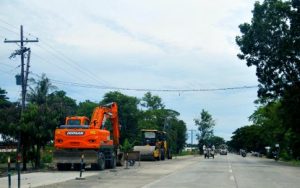
PUERTO PRINCESA CITY, Palawan — The Palawan Provincial Board (PB) on Monday reminded the Department of Public Works and Highways (DPWH) to put road signs on their projects to avoid vehicular accidents.
Provincial information officer Gil Acosta Jr. said the reminder came through a resolution authored by Board Member Clarito Demaala IV, which was approved by the PB on October 9.
Acosta said the resolution wants the DPWH to remind its contractors to put up the signs to ensure the safety of the public.
“Mahalagang mapakiusapan ang mga kinauukulang ahensya at ang contractors sapagkat importante ang road signs upang masiguro ang kaligtasan ng mga motorist at ng mga mamamayan (It is important to request the proper agencies and the contractors because road signs are vital in keeping motorists and the public safe),” he said.
Acosta added that although there have been noticeable improvements, these are not enough as there are many road projects in Palawan.
Board Member Albert Rama agreed, saying it would even be better if the DPWH contractors will speed up the completion of the road projects.
“Kasi ‘yong pagkaputul-putol niya at ang tagal matapos ‘yon ang nagiging cause ng disgrasya. Pero ‘yong iba, may road signs na rin pero insufficient pa rin ang road signs (The way the road projects are implemented is by section and they took long to complete. There are road signs in other projects, but these are insufficient),” Rama said.
He said project and district engineers of the DPWH and the contractors will be invited to the session of the PB to get their commitment to putting the safety signs and ensuring the fast completion of road works.
The DPWH is currently implementing the PHP30-billion six-lane superhighway road-widening project involving 600 kilometers of the road network in the entire mainland of the province.
The project is seen to strengthen the tourism trade among Brunei-Indonesia-Malaysia-Philippines (BIMP) – the sub-regional economic cooperation initiative East ASEAN Growth Area (EAGA) – which focuses on “connectivity as vital for the seamless movement of goods, services and people.” (Celeste Anna Formoso/PNA)
